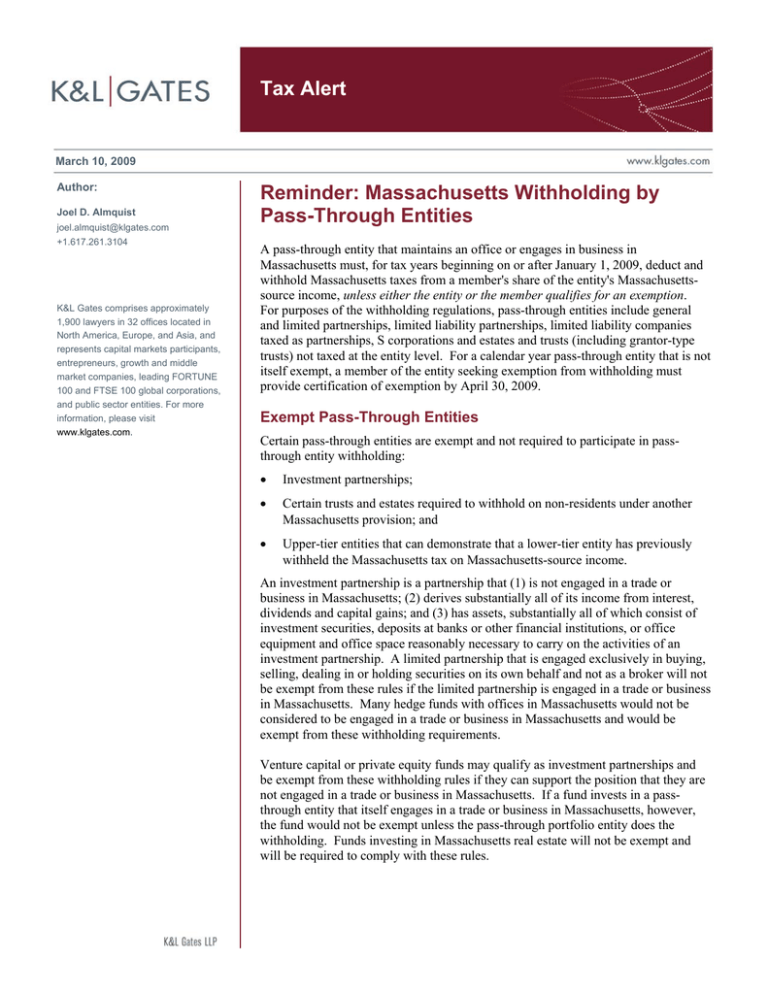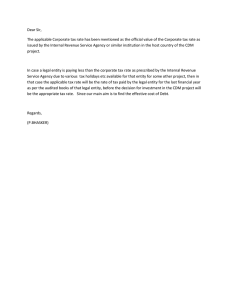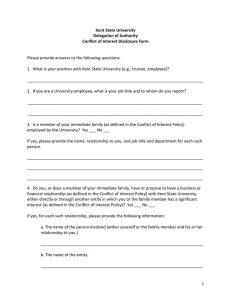
Tax Alert
March 10, 2009
Author:
Joel D. Almquist
joel.almquist@klgates.com
+1.617.261.3104
K&L Gates comprises approximately
1,900 lawyers in 32 offices located in
North America, Europe, and Asia, and
represents capital markets participants,
entrepreneurs, growth and middle
market companies, leading FORTUNE
100 and FTSE 100 global corporations,
and public sector entities. For more
information, please visit
www.klgates.com.
Reminder: Massachusetts Withholding by
Pass-Through Entities
A pass-through entity that maintains an office or engages in business in
Massachusetts must, for tax years beginning on or after January 1, 2009, deduct and
withhold Massachusetts taxes from a member's share of the entity's Massachusettssource income, unless either the entity or the member qualifies for an exemption.
For purposes of the withholding regulations, pass-through entities include general
and limited partnerships, limited liability partnerships, limited liability companies
taxed as partnerships, S corporations and estates and trusts (including grantor-type
trusts) not taxed at the entity level. For a calendar year pass-through entity that is not
itself exempt, a member of the entity seeking exemption from withholding must
provide certification of exemption by April 30, 2009.
Exempt Pass-Through Entities
Certain pass-through entities are exempt and not required to participate in passthrough entity withholding:
•
Investment partnerships;
•
Certain trusts and estates required to withhold on non-residents under another
Massachusetts provision; and
•
Upper-tier entities that can demonstrate that a lower-tier entity has previously
withheld the Massachusetts tax on Massachusetts-source income.
An investment partnership is a partnership that (1) is not engaged in a trade or
business in Massachusetts; (2) derives substantially all of its income from interest,
dividends and capital gains; and (3) has assets, substantially all of which consist of
investment securities, deposits at banks or other financial institutions, or office
equipment and office space reasonably necessary to carry on the activities of an
investment partnership. A limited partnership that is engaged exclusively in buying,
selling, dealing in or holding securities on its own behalf and not as a broker will not
be exempt from these rules if the limited partnership is engaged in a trade or business
in Massachusetts. Many hedge funds with offices in Massachusetts would not be
considered to be engaged in a trade or business in Massachusetts and would be
exempt from these withholding requirements.
Venture capital or private equity funds may qualify as investment partnerships and
be exempt from these withholding rules if they can support the position that they are
not engaged in a trade or business in Massachusetts. If a fund invests in a passthrough entity that itself engages in a trade or business in Massachusetts, however,
the fund would not be exempt unless the pass-through portfolio entity does the
withholding. Funds investing in Massachusetts real estate will not be exempt and
will be required to comply with these rules.
Tax Alert
An exempt pass-through entity does not need to
obtain from its members the Form PTE-EX
certifications described below.
Exempt Members
The following types of members are exempt and
withholding is generally not required for such a
member, provided that a non-exempt pass-through
entity obtains the appropriate certification from the
member by the applicable deadline:
•
A member that is exempt from federal income
tax under Internal Revenue Code § 501 if the
member’s share of income from the entity is
exempt from Massachusetts tax;
•
An individual Massachusetts resident;
•
A corporation with income (other than passthrough entity income) subject to Massachusetts
tax for which it is filing a return;
•
A pass-through entity, trust, estate or custodial
account that certifies that it will be filing any
required Massachusetts tax returns, reporting its
share of income from the entity, and making
required estimated tax or withholding payments,
as appropriate;
•
A non-resident member who:
o
Participates in a composite return prepared
by the entity; or
o
Files a certification with the entity stating
that it agrees to file any required
Massachusetts tax returns, make any
required quarterly Massachusetts estimated
tax payments, and accept personal
jurisdiction in Massachusetts state courts for
the determination and collection of taxes;
•
An upper-tier pass-through entity that certifies
that all of its members are exempt from
withholding under the exemptions described
above; and
•
An insurance company.
Form PTE-EX Certifications
For a member to be treated as exempt, a non-exempt
entity must obtain from the member, on or before
the later of the last day of the fourth month of the
entity's taxable year or within 30 days of the
member joining the entity, a completed Form PTEEX certifying that the member is exempt from
withholding. For calendar year non-exempt passthrough entities, the certification must be obtained
from all members, including Massachusetts
residents, by April 30, 2009.
A member's signed Form PTE-EX will remain in
effect until it is revoked by the member, unless the
member completed the Form PTE-EX prior to its
amendment in December 2008, in which case the
member must renew the form in 2010. A member
whose reason for a withholding exemption changes
or who loses exempt status during the tax year must
notify the entity within 30 days. The non-exempt
entity must retain the completed forms in its records
and produce them upon request by the
Massachusetts Department of Revenue.
Withholding by Pass-Through Entity
If a pass-through entity is required to withhold, the
entity must register for withholding and make a
required annual payment, in four equal installments,
on behalf of each non-exempt member. Each
quarterly installment is due on or before the last day
of the month following the close of the quarter of
the entity's taxable year. An entity required to
withhold is jointly and severally liable with each
non-exempt member for Massachusetts taxes,
together with related interest and penalties, imposed
on the member with respect to the income of the
entity. An entity that fails to meet its withholding
obligation is subject to all applicable penalties for
failure to adequately withhold.
Schedule PTE
A non-exempt pass-through entity with non-resident
members must electronically submit an annual
schedule (Schedule PTE) on or before the last day
of the third month of the year following the taxable
year, unless an extension is obtained, and the
schedule is considered part of the entity’s annual tax
return. The annual schedule generally must include
non-resident and non-exempt members. Schedule
PTE is used by the Massachusetts Department of
Revenue to reconcile amounts withheld and credits
claimed by members. The schedule must include the
amount withheld on behalf of each non-exempt
March 2009
2
Tax Alert
member and the method of tax compliance for each
non-resident member.
Circular 230 Notice
To ensure compliance with requirements imposed by
the IRS, we inform you that any U.S. federal tax
advice contained in this communication (including
any attachments) is not intended or written to be
used, and cannot be used, for the purpose of (1)
avoiding penalties under the Code or (2) promoting,
marketing, or recommending to another party any
transaction or matter addressed herein.
K&L Gates comprises multiple affiliated partnerships: a limited liability partnership with the full name K&L Gates LLP qualified in Delaware and
maintaining offices throughout the U.S., in Berlin and Frankfurt, Germany, in Beijing (K&L Gates LLP Beijing Representative Office), in Singapore
(K&L Gates LLP Singapore Representative Office), and in Shanghai (K&L Gates LLP Shanghai Representative Office); a limited liability partnership
(also named K&L Gates LLP) incorporated in England and maintaining our London and Paris offices; a Taiwan general partnership (K&L Gates)
which practices from our Taipei office; and a Hong Kong general partnership (K&L Gates, Solicitors) which practices from our Hong Kong office.
K&L Gates maintains appropriate registrations in the jurisdictions in which its offices are located. A list of the partners in each entity is available for
inspection at any K&L Gates office.
This publication is for informational purposes and does not contain or convey legal advice. The information herein should not be used or relied upon
in regard to any particular facts or circumstances without first consulting a lawyer.
©2009 K&L Gates LLP. All Rights Reserved.
March 2009
3




